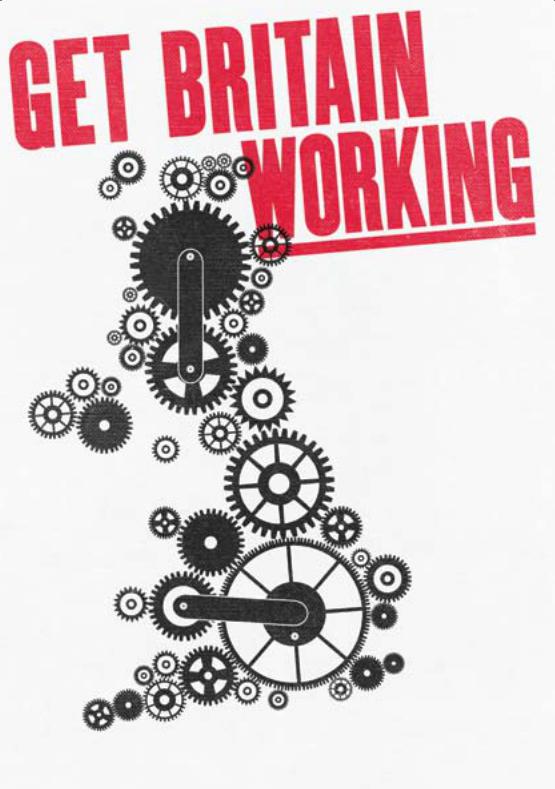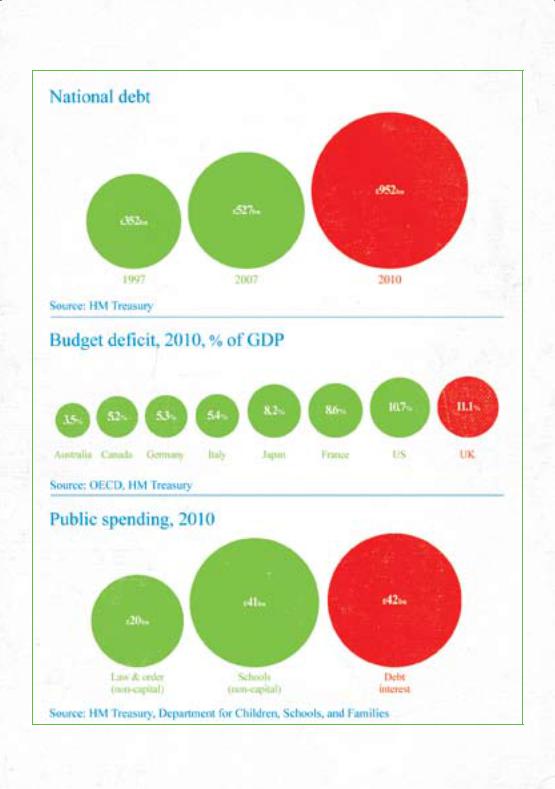
Программа Консерваторов
.pdf
Glasgow
Glasgow is the largest city in Scotland, and home to 13,000 businesses, including some of Britain’s most successful firms. For example, eight of the ten largest insurance companies in the UK have an office in Glasgow, and the city is also home to leading technology, energy and creative businesses. Glasgow is the hub of an important entrepreneurial sector, which includes innovative start-ups in fields such as mobile telephony and computer games. Glasgow’s commercial strength also extends to manufacturing, and the city continues to be a global leader in hi-tech ship building.

Change the economy


change the economy | introduction
Get the economy moving
Gordon Brown’s debt, waste and taxes have wrecked the economy and threaten to kill the recovery. A Conservative government will take action now to cut the deficit, stop Labour’s jobs tax, help keep mortgage rates low and get the economy moving. We will create a new economic model built on investment and savings, not borrowing and debt.
Where is the growth going to come from? Who will provide jobs for the millions out of work? How will families be able to aspire to a better future? These are the questions being asked about Britain, at home and abroad.
One thing is clear. We can’t go on with the old model of an economy built on debt. Irresponsible public spending, an overblown banking sector, and unsustainable consumer borrowing on the back of a housing bubble were the features of an age of irresponsibility that left Britain badly exposed to the economic crisis. Now, with the national debt already doubled and in danger of doubling again, it is this debt – together with the jobs tax that Labour will introduce to help pay for it – that threatens to kill the recovery.
Britain needs a new economic model. Saving and business investment must replace reckless borrowing as the foundation of growth. We need to boost enterprise and develop a low carbon, hi-tech economy. Our exports must grow. We need to get Britain working by creating jobs in the private sector, and we must get better value for money from the public sector.
With the next Conservative government, our tax system, education and national infrastructure will help British firms out-compete their global rivals, not hold them back. We will build a more balanced economy that does not depend so heavily on the success of financial services, and where all parts of the country share in the gains. The bedrock of this new economic model will be the stability and low interest rates that come from a credible plan to reduce our record budget deficit, protect Britain’s credit rating and give taxpayers value for their money.
Building this new economic model requires a national effort. We can reverse Britain’s economic decline – but only if we accept that we are all in this together. No government, even a strong and united one, can create a better country alone. It needs individuals, families and businesses pulling alongside. We want to unite everyone in our country behind this bold vision of a new British economic model.
3


change the economy | benchmarks for britain
Benchmarks for Britain
For the first time, the British people will have eight clear and transparent benchmarks against which they can judge the economic success or failure of the next government. We will be accountable and open. These are the eight Benchmarks for Britain. Achieving them over the next Parliament will mean we have put Britain back on its feet and are building a new British economic model, very different from the debt-driven economy of recent years.
1.Ensure macroeconomic stability: We will safeguard Britain’s credit rating with a credible plan to eliminate the bulk of the structural deficit over a Parliament. Our fiscal policy will seek to help keep interest rates lower for longer. The independent Bank of England will continue to target 2 per cent Consumer Price Index (CPI) inflation, and will use its new role in prudential supervision to preserve financial stability.
2.Create a more balanced economy: We will create the conditions for higher exports, business investment and saving as a share of Gross Domestic Product (GDP).
3.Get Britain working again: We will reduce youth unemployment and reduce the number of children in workless households as part of our strategy for tackling poverty and inequality.
4.Encourage enterprise: We will improve Britain’s international rankings for tax competitiveness and business regulation.
5.Ensure the whole country shares in rising prosperity: We will increase the private sector’s share of the economy in all regions of the country, especially outside London and the South East.
6.Reform public services to deliver better value for money: We will raise productivity growth in the public sector in order to deliver better schools and a better NHS.
7.Create a safer banking system that serves the needs of the economy: We will reform the regulation and structure of the banking system to ensure lower levels of leverage, less dependence on unstable wholesale funding, and greater availability of credit for small and medium-sized enterprises (SMEs).
8.Build a greener economy: We will reduce UK greenhouse gas emissions and increase our share of global markets for low carbon technologies.
5

6

change the economy | ENSURE MACROECONOMIC STABILITY
Ensure macroeconomic stability
We will safeguard Britain’s credit rating with a credible plan to eliminate the bulk of the structural deficit over a Parliament. Our fiscal policy will help keep interest rates lower for longer. The independent Bank of England will continue to target 2 per cent CPI inflation, and will use its new role in prudential supervision to preserve financial stability.
After a decade of mismanagement, the UK entered the recession in poor shape, with the second biggest budget deficit in the developed world. We have been honest about the scale of the problem, and the actions we will need to take to deal with it. This will not be easy, but we can overcome our problems if we all pull together.
The absence of a credible plan to deal with our record budget deficit, the largest of any major economy, is creating uncertainty over Britain’s credit rating and interest rates. This instability undermines confidence and jeopardises investment. It could tip Britain back into recession. This is Gordon Brown’s legacy – and why the greatest risk to our economic recovery is five more years of Gordon Brown.
Urgent action to reduce debt
Urgent action is needed if we are to avoid the higher borrowing costs that would inevitably follow from a credit rating downgrade. So we will cut wasteful government spending to bring the deficit down and restore stability.
We will increase spending on health in real terms every year and honour our commitments on international aid, but our plan to get a grip on the deficit will include cuts to wasteful spending in many other departmental budgets. That will enable the independent Bank of England to keep interest rates as low as possible for as long as possible.
To ensure that no Labour government can ever attempt to bankrupt our public finances again, we will set up an independent Office for Budget Responsibility to restore trust in the government’s ability to manage the public finances.
We will provide an emergency Budget within
50 days of taking office to set out a credible plan for eliminating the bulk of the structural current budget deficit over a Parliament. The case for starting early to re-establish our economic credibility is overwhelming, and is backed by economists and business leaders.
7

change the economy | ENSURE MACROECONOMIC STABILITY
We will start by cutting a net £6 billion of wasteful departmental spending in the financial year 2010/11. In addition, we will make the following savings:
•freeze public sector pay for one year in
2011, excluding the one million lowest paid workers;
•hold a review to bring forward the date at which the state pension age starts to rise to 66, although it will not be sooner than 2016 for men and 2020 for women;
•stop paying tax credits to better-off families with incomes over £50,000;
•cut government contributions to Child Trust Funds for all but the poorest third of families and families with disabled children;
•cap public sector pensions above £50,000;
•cut Ministers’ pay by 5 per cent, followed by a five year freeze; and,
•reduce the number of MPs by 10 per cent.
Over the course of a Parliament, we will cut Whitehall policy, funding and regulation costs by a third, saving £2 billion a year, and save a further £1 billion a year from quango bureaucracy.
Cut government waste to stop
Labour’s jobs tax
Labour are planning to increase National Insurance in 2011. Anyone earning over
£20,000 will pay more tax, and employers will pay more tax on all jobs paid over £5,700. This jobs tax, which will hit small businesses especially hard, will kill off the recovery.
Experts predict it will cost 57,000 jobs in small and medium-sized businesses alone.
At the same time, Labour will not take action to cut waste in government. They have identified
£11 billion pounds of waste, but they do not plan to start dealing with it until April 2011. So Labour will continue wasting money while putting up taxes on working people.
We will act immediately to cut government waste so we can stop the most damaging part of the National Insurance rise for employers and for anyone earning under £35,000.
We will make the following changes in April 2011, relative to Labour’s plans:
•raise the primary threshold for National Insurance by £24 a week and raise the Upper Earnings Limit by £29 a week; and,
•raise the secondary threshold at which employers start paying National Insurance by £21 a week.
8

change the economy | ENSURE MACROECONOMIC STABILITY
Seven out of ten working people – those earning between £7,100 and £45,400 – and almost every employer will save up to £150 a year per person compared to under Labour.
Lower earners will get the greatest benefit as a percentage of their earnings. Nobody will be worse off as a result of these changes.
Our plans are backed by many of Britain’s top business leaders, who between them employ more than half a million people, as well as by Britain’s leading business organisations.
To pay for this we will take immediate action to cut a net £6 billion of wasteful departmental spending in the financial year 2010/11, with further savings in future years. This is in addition to the savings made by cutting tax credits and Child Trust Funds for better-
off families.
These actions will allow us to reduce the deficit more quickly than Labour year-on-year while avoiding the most damaging part of their jobs tax. It will also lower the proportion of the reduction of the structural deficit that is accounted for by tax increases, from about one third towards one fifth. This is in line with international best practice, as well as the Treasury’s own internal analysis.
Former government advisers Sir Peter Gershon and Dr Martin Read have advised us that savings of £12 billion across all departmental spending are possible in-year without affecting
the quality of frontline services. These are over and above any savings already planned by Labour. We will achieve this through:
•a freeze on major new Information and
Communications Technologies (ICT) spending;
•immediate negotiations to achieve cost reductions from major suppliers;
•tighter control of public sector recruitment;
•reductions in discretionary spending, including travel, expenses, advertising, consultancy and office supplies; and,
•reductions in public sector property costs.
We will match Labour’s spending plans for 2010/11 in health and overseas aid. Given our commitment to carry out a Strategic Defence and Security Review, it would also not be appropriate to make in-year reductions to the existing defence budget in 2010/11. Savings in these protected areas will be channelled back into frontline services. The net £6 billion of savings will be made from the remaining departmental budgets.
9
